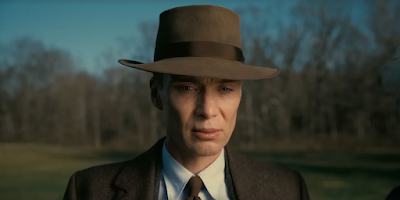Running three hours, “Oppenheimer” both does and does not feel that long, running all the while at ludicrous speed even as, paradoxically, it plods. It plods because despite so much time-jumping and location-shifting, so many bells and whistles, crushing sound design and an omnipresent Ludwig Göransson musical score, Nolan mostly moves the movie forward through dialogue. He based his script for “Oppenheimer” on Kai Bird and Martin J. Sherwin’s book “American Prometheus,” which I have not read and, therefore, am unable to evaluate as a faithful or unfaithful adaptation. But I have read plenty of historical biographies in my time and the dialogue in “Oppenheimer” is less interesting or riveting in and of itself than what sounds like expository text of a historical biography translated to the screen, A-list History Channel reenactments. Tina Satter’s recent HBO movie “Reality” was virtually all dialogue too, yet breathed life because of how her visuals set up words, or how her frames became reflections of the words. For large swaths of “Oppenheimer,” the words cue images, leading us forward with a verbal blueprint, flipping from figurative page to page. You could cut the visual, just leave the audio, and lose nothing, a moving picture as radio drama, too frequently failing dream as big as its 70mm format would imply.
For a while, at least, Oppenheimer presents as a fascinating figure, aloof, awkward, brilliant, blocks ahead of most everyone and not able to adjust for those who are not. And though it’s true that part of the point of the character is that he compartmentalizes, to borrow the movie’s own terminology, it doesn’t really root around in those compartments, his myriad complications and conflicting thoughts glossed over, mentioned in dialogue but never lived out in Murphy’s turn, his big blue eyes a compelling, haunting image on screen, almost as fabulous and frightening as the bomb itself, which we’ll get to, but ultimately empty because the movie hollows him out from within. It is not so much that in J. Robert’s affair with Communist Party member Jean Tatlock (Florence Pugh), he is compartmentalizing as it is that their whole relationship hardly plays like a real human experience, summarized in the most studied sex scene I can remember seeing, the whole thing less in-the-throes-of-passion than a drawn out excuse to have him to say he is “the destroyer of worlds,” which says less about Oppenheimer, honestly, than Nolan. Indeed, Communism in terms of “Oppenheimer” is not a political theory but a plot point, reduced to a weapon of narrative conflict in a way that, frankly, isn’t so far off from the people running the security hearing to which the main character is subjected.
The movie’s show-stopping scene, in more ways than one, is the Trinity test, magnificently comprised of mostly fire and faces, the latter reflected in the former, as if putting a point on what these people have wrought. It’s something else, it really is, and it’s true that while Nolan’s relentless forward momentum hampers his epic elsewhere, it works here. Because in duly honoring the bomb’s shockwave, silence for a good 30 seconds before the colossal boom, you feel the weight of all that talking suddenly falling away so all that remains is awe by way of sheer blinding terror. From there, Nolan goes right back to his puzzle, and though the act of putting together a puzzle often matters more than the finished image, that’s less true when the finished image is a mushroom cloud, and the final puzzle piece is intended as a big revelation. That revelation, though, the missing piece of a conversation seen briefly toward the beginning, merely reiterates what the Trinity test has already demonstrated, putting into perspective why the ostensible suspenseful wrap-up feels like such a distancing drag. Once the bomb goes off, the movie, like the world itself, the movie suggests, is effectively over.





No comments:
Post a Comment